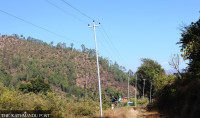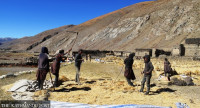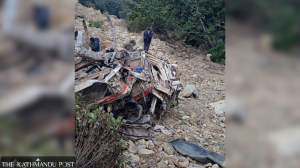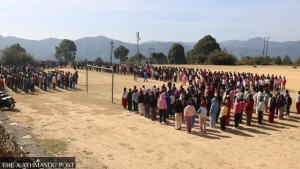Karnali Province
Water lift projects ease Karnali water crisis
Drinking water shortage had made life difficult not just for adults but also for children who had to skip classes to manage water.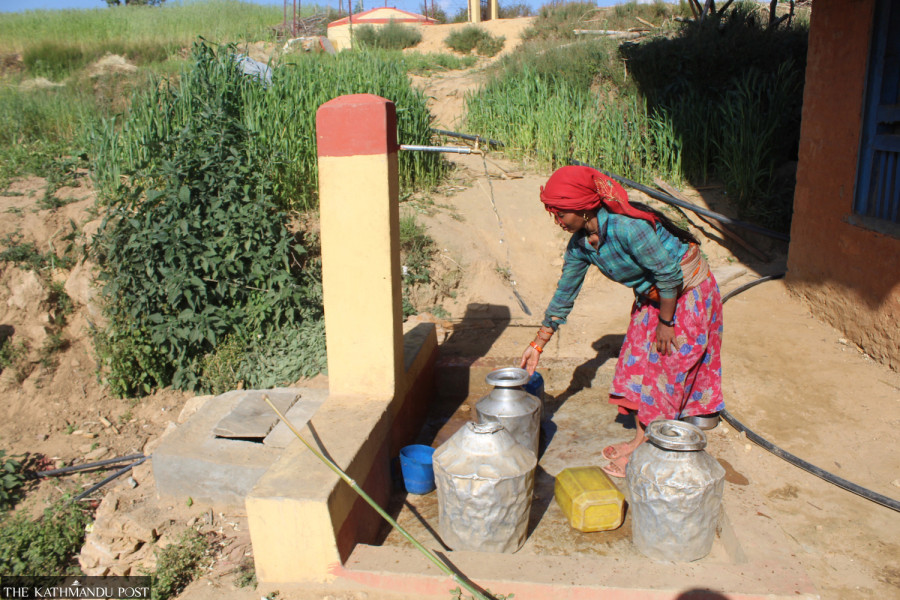
Hari Gautam
Rima Oli, a resident of Baraneti settlement in Tribeni Rural Municipality-10, had to wake up in the wee hours every day to fetch drinking water until a few months ago. She had to walk for around half an hour to reach Padherikhola, a natural water source below the settlement, and wait for hours to fill a jar with water.
Oli’s hardship is now a thing of the past.
“We had to stay in line for hours just to fill one gagri (a traditional water pot) with water. The villagers are finally relieved of the problem as the local unit started supplying water to each household,” said Oli.
As many as 110 households at Baraneti were reeling under a shortage of drinking water until the completion of Simtarekhola Rural Solar Drinking Water Project a few months ago.
“The villagers, mainly women, had to wake up at around 2am and rush to Padherikhola to bring drinking water,” said Karna Bahadur Khadka, a local man.
According to him, the scarcity of water had made lives difficult not just for adults but also for children. “The children also had to help in carrying water from local springs to their homes. So most days they would miss school and they never had the time to study at home,” said Khadka.
The villagers are now happy as piped water is supplied to each household. Water from the Simtarikhola is lifted using a solar power plant and distributed to 110 houses of Baraneti, Rupari, Chaukhe, Palpalek, Damar, Totke and Sanchaur settlements.
“Earlier there was no alternative to filling water jars at Padherikhola. Now water from Simtarikhola is being lifted by using modern technology and distributed to the villagers. The completion of the development project has come as a boon for us,” said Tike Oli, another villager.
The villagers have even started growing green vegetables in their kitchen garden using piped water. “We don’t worry about water nowadays. We have enough water for household chores and sanitation,” said Tikaram Oli, secretary of the drinking water consumers’ committee.
According to him, the water lifting project was completed at the cost of Rs15 million, 35 percent of which was met by labour contribution by the consumers. “The consumers used their own money to build a tap and install a pipeline,” said Tikaram.
In Jumla, another hill district of Karnali, an ambitious water lifting project is under construction for supplying water to 9,100 households of 19 wards of three local units in the district.
The construction of Dhailigad Drinking Water Project has begun with an estimated cost of Rs1.36 billion. Federal Minister for Water Supply Umakanta Chaudhary laid the foundation stone to start the drinking water project on Saturday.
The project aims to lift water from Dhailigad river and distribute it to the people of wards 1 to 10 of Chandannath Municipality, wards 3 to 5 of Guthichaur Rural Municipality and wards 1 to 6 of Tatopani Rural Municipality. Chandannath Municipality and Guthichaur Rural Municipality will provide Rs5 million each to the project while Tatopani Rural Municipality will provide Rs4.6 million to the project. The federal government will manage the rest of the amount required to accomplish the project within two years.
(With input from LP Devkota in Jumla)




 13.12°C Kathmandu
13.12°C Kathmandu.jpg)




